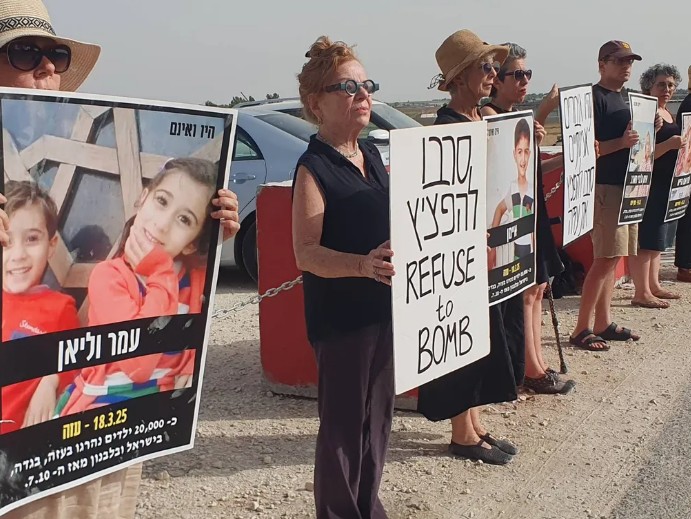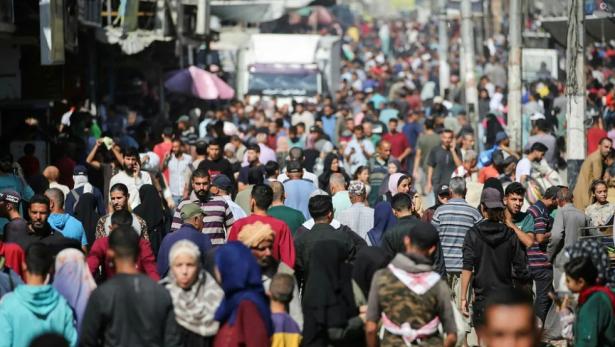Will Israelis One Day Say of Their Country’s Atrocities in Gaza, ‘I Was Always Against It’?
Optimists say that, ultimately, Israelis will grasp the scope of the atrocity they committed in the Gaza Strip. The truth will seep into their consciousness.
The old videos of infants who were blown to bits by our bombs will at some point reach Israelis' hearts and pierce them. They will suddenly see children coated in the dust of the crushed concrete beneath which they were rescued, shaking uncontrollably and staring blankly with an expression that is all a big question mark.
At some point, they will realize that the individual viciousness of revenge demonstrated by so many soldiers – often accompanied by bursts of laughter and smiles that streamed through TikTok, and the cold, surgical, and anonymous lethal viciousness of those playing video games from the cockpits and control rooms – are not a mark of heroism but a serious illness. Social and personal.
Parents, the optimists believe, will be unable to sleep at night, worried that the Xs on their sons' rifles mark women, old people, and just youngsters gathering herbs for food. The day will come when adolescents will ask their fathers, who were soldiers back then, whether they too obeyed an order to shoot an old man who crossed an unknown red line.
The daughters of decorated pilots will ask whether they dropped a proportionate bomb that killed a hundred civilians for one mid-level Hamas commander. Why didn't you refuse? The daughter will sob.

The grandchildren of a retired prison guard will ask, did you personally beat a shackled detainee until he fainted? Did you obey a minister's order and deny prisoners food and showers? Did you crowd 30 detainees in a cell meant for six? Where did they get skin diseases? Did you know any of the dozens of detainees who died in an Israeli prison from starvation or from beatings and torture? How could you, Grandpa? The nephews of Supreme Court justices will read their rulings that permitted all of that and they will stop visiting them on Shabbat.
At some point, the optimists believe, the Israeli media's obscuring of reality will cease to brainwash and numb hearts. The phrase, "the context," will not be considered a profanity and the public will connect the dots: Oppression. Expulsion. Humiliation. Deportation. Occupation. And all the suffering between them. They are not parts of slogans that self-hating Jews coined, but describe the life of an entire people, for years, under our orders and our guns.
People are not born cruel; they become such. The cruelty of Palestinians towards Israelis is covered extensively in our media, articles and close-ups. It developed in response and resistance to our foreign and hostile rule. Our cruelty, that of Israeli society, is getting ever more sophisticated with the aim of protecting our spoils: the land and the water and the freedoms from which we expelled the Palestinians.
The optimists believe that there is a road back. How lucky they are, the optimists.
[Amira Hass is a reporter and columnist for Ha’aretz Daily, a newspaper based in Tel Aviv, Israel. She has been a journalist for two decades.
Hass, 53, has written critically about both Israeli and Palestinian authorities. She has not allowed her gender, ethnicity or nationality – all hindrances in the region she reports from – to obstruct her from pursuing the truth in her reporting.
In 1989, Hass quit her studies in history at Tel Aviv University and began working as a copy editor for Ha’aretz Daily. At the same time, she volunteered for Workers Hotline, a human rights group dedicated to reaching out to vulnerable workers, many of whom were Palestinian. She became acquainted with life in Gaza and grew frustrated about how poorly Israel’s occupation of Gaza was represented in the Israeli press.
By 1991, Hass was writing weekly features for Ha’aretz Daily, and in 1993, she became a full-time writer for the paper. She moved to Gaza, which at the time was under direct and full Israeli occupation.
Hass, now based in Ramallah, has lived in the Occupied Palestinian territories for nearly 16 years. She has been reporting on the life of Palestinians under the Israeli occupation and covering the major armed clashes and Israeli military attacks. Her goal has been to provide her readers with detailed information about Israeli policies, especially restrictions on the freedom of movement.
In the course of her work, Hass has been threatened, harassed and detained. Most recently, in May 2009, she was detained by Israeli police on her return from a four-month stay in Gaza “for violating a military order” (which forbids entry into Gaza) and “for staying illegally in an enemy state.” She had also been detained in December 2008 by Israeli police on her return to Ramallah for violating the same military order.]


Spread the word